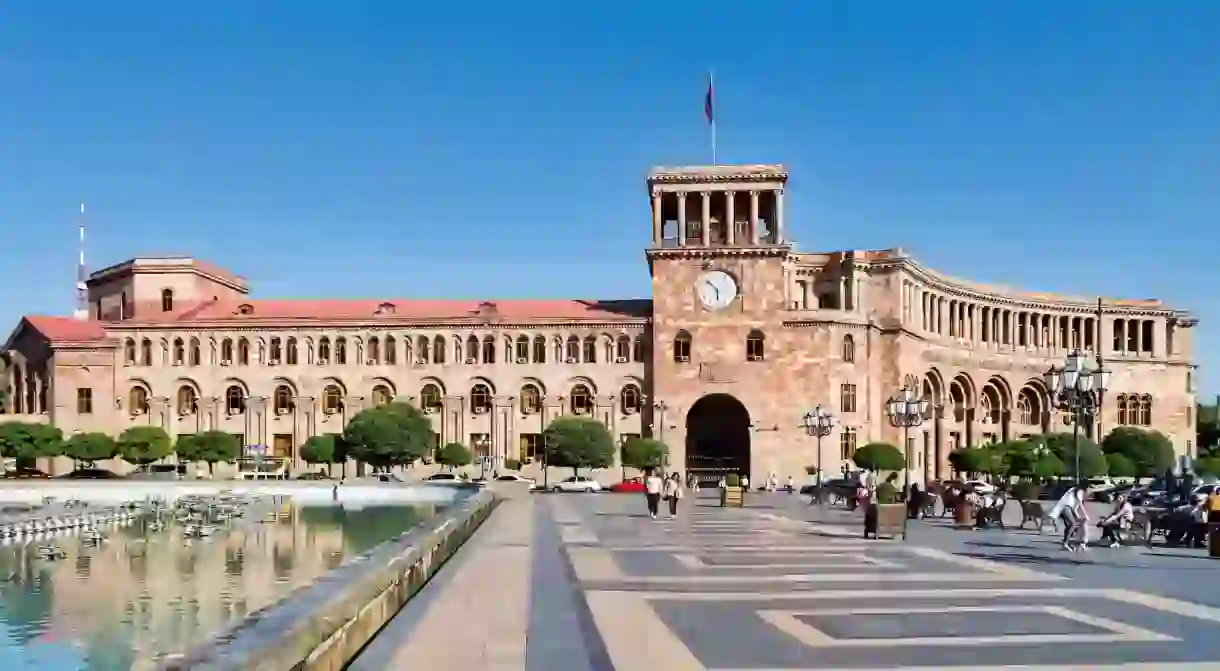Must-Visit Attractions in Yerevan

Armenia’s capital Yerevan might not be on your radar of the places to visit in 2018. Yet, the country’s largest city contains some rather interesting monuments you might want to check out. Yerevan is also one of the world’s oldest inhabited cities, therefore history and archeology buffs will enjoy their time here. But don’t worry if you don’t like visiting museums, because the city tries to satisfy each of its visitors by offering various parks, art museums, historical sights, and even a brandy factory.
Cascade Stairway and Museum
Library, Museum

Freedom Square
Park, Theater

Freedom Square, or Liberty Square as it is also often called, is a town square situated in the central district of the city. It is part of the Yerevan Opera Theater complex, located between Swan Lake and the Opera Park. Freedom Square, along with the Republic Square, is one of the main squares in the center of the capital bordering four streets: Mashtots Avenue, Sayat Nova, Tumanyan Steet, and Teryan Streer.
Mother Armenia Monument
Museum, Park

Erebuni Museum
Museum

The opening of the Erebuni Museum in 1968 coincided with the 2,750th anniversary of the city. Standing at the foot of Atin Berd hill, you can explore the museum and the Urartian Fortress Erebuni that sits atop it, which has been turned into an outdoor museum. According to the inscription, the area was built by the King of Urartu, Argishti I, in 782 BCE. Most parts of the fortress were built from raw bricks, while the castle was surrounded by strong walls. Archeologists have found a large collection of artifacts, jars, everyday items, bronze bracelets, agate beads, and glass items, among other things.
Ararat Brandy Factory
Brewery

Sergei Parajanov Museum
Museum

Sergei Parajanov was a Soviet director and artist of Armenian origin. The house museum represents his artistic and literary heritage, and was founded in 1988 when Parajanov moved to Yerevan and started the construction project for it. Due to socio-economic problems and the 1988 earthquake, the museum was opened only after his death, in 1991. Being one of the cultural centers of the capital, the museum is known for its publications, exhibitions, and honorary receptions. Wander through two floors showcasing around 1,400 items, including drawings, hats, Parajanov’s memorabilia, original posters, festival prizes, unpublished screenplays, and his various artworks.
The Armenian Genocide Museum
Memorial, Museum

Yerevan Great Blue Mosque
Mosque

This beautiful Blue Mosque is a Shia mosque built in the 18th century. Much like any other religious buildings, the mosque stopped its service during Soviet rule. However, after Armenia gained its independence, the mosque was renovated with support from the Iranian government. Being the only mosque in the whole country, Blue Mosque is a fascinating architectural site with its colorful design both inside and out, as well as its dome that attracts the eye from a distance.
History Museum of Armenia
Museum

History buffs will enjoy a visit to the History Museum of Armenia, which has departments of numismatics, ethnography, archaeology, and modern history. With its national collection of 400,000 objects, the museum is regarded as Armenia’s national museum. Here, you can find a large collection of bronze items dating back to the 3rd-2nd millennia BC, the historical-cultural heritage of Urartu, a collection of gold, silver, and copper coins of different countries and kingdoms, just to name a few.













